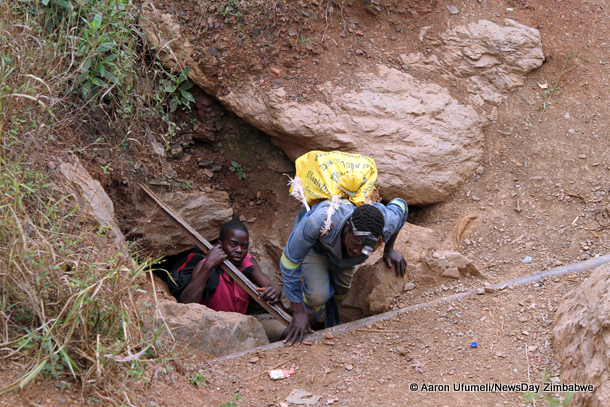
A GROUP of artisanal miners scurry for cover at the sound of a vehicle engine in Chakari, armed with their tools of the trade, including hammers and chisels and makeshift satchels on their backs.

Their fear stems from the brutality they have encountered in the past at the hands of the police and a possibility of spending two years in prison for illegal mining.
The setting is a disused mine in Chakari, 34 kilometres from Chegutu in Mashonaland West, where the news team was to check on the reports of two miners having been trapped to death at one of the disused mines.

The vehicle the artisanal miners, popularly known as makorokoza, are running away from has harmless journalists hunting for a story.
While running away, the miners yell insults to the news team thinking they were police officers, who in their own admission are not the best of their friends.
Watch video below:
“Who are you? We know you are police officers and want to arrest us. We don’t trust people dressed like you,” yelled one of the miners who was about to jump into their work-station, a tunnel with a small hole as entrance before the arrival.
- Chamisa under fire over US$120K donation
- Mavhunga puts DeMbare into Chibuku quarterfinals
- Pension funds bet on Cabora Bassa oilfields
- Councils defy govt fire tender directive
Keep Reading
There was tension as the miners advanced from different angles with some shouting obscenities. “We can only talk to you if you bring the councillor with you. Show us your IDs if you want us to believe you. You are cops and we know you,” said one of the makorokozas.
After minutes of trying to get to know each other, the miners warmed up and opened up on the reported fatality at the makeshift mine that has become their source of livelihood since 2012 after the closure of Falcon Mine that left more than 1 500 people jobless.
Their tale is like a movie aptly titled The Worst of Both Worlds.

The artisanal miners encounter the cruelty of the socio-economic decay and a possibility of jail or attacks in the hands of police while out of the tunnels and when in, death is a possibility and can visit them anytime.
They have witnessed colleagues dying in tunnels, but they are not afraid of death, they say it can visit one anytime and anywhere.
The miners are evasive on the issue of deaths reported at their mine, but could not deny that some of their colleagues had died.

“We don’t know whether they died or not. What we know is they are in hospital. One of them was retrieved around 2pm while the other one had to be removed around 7 in the evening,” said Tinoziva Rungano, one of the illegal miners.
Asked whether there were reports of death in the past, one of them who only wanted to be referred to as Clever quipped: “It’s like you driving along the highway and you witness an accident, you can’t say, therefore, you are abandoning the journey because of that.”
“If you are down there, expect anything. A big stone can fall on you and it depends where it hits you. If it hits you hard on a sensitive spot, you are gone. For sure you die,” he added.
The artisanal miners go down under with nothing to protect themselves except a torch on their forehead, water, bread and biscuits to keep them alive.
They usually spend more than five days, but no less than a full week in the tunnel.

Falcon Mine closed down in 2012 leaving more than 1 500 people jobless and more than 10 000 dependants stranded.
“This project here is what is keeping Chakari alive. All the women in the business of cooking sadza nearby rely on us, all the flea markets, the bottle stores and furniture shops rely on us. We are the industry here,” said one of the miners.
“More than 90% of the community bank on us and the remaining 10% can be left to teachers and nurses paid by government.”
These illegal miners are known for their penchant for spending and during the interviews, it emerged there were groups of them from different towns and cities who come to the “tunnel of life.”
“They are groups from here and are referred to as MaChakari, a group from Kadoma called MaKadoma, MaChegutu and MaGokwe who come here. We don’t clash, we just take turns.”
A Zanu PF youth chairperson in one of the districts, Tragedy Moyo pleaded with government to give the youths letters so that they contribute to the party economic blueprint ZimAsset.
Moyo said the Mines minister Walter Chidhakwa should address the issue of makorokoza as it was clear most youths were relying on mining for a living and sustain livelihoods hence it was time for them to be heard.
“The youths’ project has no problem. They however should get letters so that the running battles with the police ends. ZimAsset starts with them working on this land and t has to be promoted. There are almost 90% 0f people who are unemployed here and about 4 000 rely on this mine for survival.
“Government cannot ignore these youths for long. If they are blocked from mining, they will resort to crime which is what we don’t want,” Moyo said.
Their plight is for government to look into their issue and realise they are a stakeholder in the economy of the country and ZimAsset hence all they cry for, is regularization.
Under the Zimbabwe Mining Development Policy which is now before Cabinet for consideration, makorokoza are likely to benefit.
Currently their work is deemed illegal, but it benefit thousands of people in Mashonaland West, Manicaland, Midlands, Mashonaland Central, Matabeleland North, Matabeleland South and other provinces.











